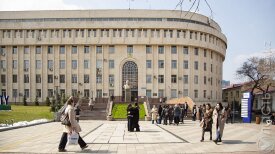During a meeting with President Kassym-Jomart Tokayev on October 23, the head of the financial regulatory agency, Madina Abylkassymova, said new measures to diminish risks in the financial sector are in the works. The regulator also plans to submit a proposal to parliament to ban the payment of dividends and bonuses to managers of banks that have not fully repaid government bailouts.
Marat Beketayev, the former minister of justice, was arrested on October 21 “while trying to escape the country,” the Anti-Corruption Agency reported, under suspicion of abuse of power. Beketayev served as minister of justice from 2016 to 2022. He was heavily involved in the arbitration battle between the government and a Moldovan businessman and his companies.
A court in the northern Akmola region converted on October 20 a prison sentence against businessman Kairat Boranbayev into a probation period with limited freedom. Boranbayev had been arrested in March 2022 and was sentenced to six years for embezzlement in September. He made a deal with the prosecutor and gave up several assets he owned in connection to a series of court cases. According to the General Prosecutor’s Office, Boranbayev will be freed at the end of next week.
Yerzhan Shaikenov, the former CEO of Tengribank, a small lender, was sentenced to 10 years in prison on October 23 for embezzlement and abuse of power. The regulator had stripped Tengribank of its banking license in mid-2020. In February 2021, Shaikenov was arrested. He was tried along with 13 other managers.
The Supreme Court overturned on October 26 the appeals verdict that had acquitted Shukhrat Donbai, the former director of the Atyrau refinery. In October 2022, Donbai was sentenced to 3.5 years in prison for theft, but a court of appeal in Atyrau acquitted him in May. Now, the Supreme Court ordered a new trial.
More than two dozen women gathered to protest poor living and housing conditions and demanded to meet the governor of the Atyrau region on October 27. The protesters made reference to the tragic death of four children in a house fire in the Abai region, because the children had been left alone at home by their working parents. Women called for more benefits for families also in early 2019, after another house fire in Astana killed five children.
Around a dozen activists were arrested on October 25, the day Kazakhstan celebrates Republic Day. The arrests took place in Almaty, Astana, and Uralsk. Opposition leaders had called for people to protest, yet the turnout was low.
NCOC, the consortium developing the Kashagan offshore oil and gas field in the Caspian, and Kaztransoil, the country’s pipeline monopolist, agreed to kick-start oil shipments through Russia via the Atyrau-Samara pipeline. In a press release from October 24, Kaztransoil said the plan is to pump at least 80,000 tons of oil monthly. From Samara, in Russia’s Volga region, the oil will then be shipped onwards to the Novorossiysk port on the Black Sea.
The ministry of economy said it will propose an additional tax bracket for people earning more than 40 million tenge ($85,000) per year to be included in the new Tax Code. During a question time at the Senate on October 27, minister Alibek Kuantyrov said the base flat rate will remain at 10%, while the tax on the richer incomes will be set at 25%. According to official statistics, more than 90% of Kazakhstan’s residents showed income below 1.8 million tenge per year.
The Week in Kazakhstan goes on a two-week hiatus. Sign up to our English-language newsletter by clicking here.
Поддержите журналистику, которой доверяют.








